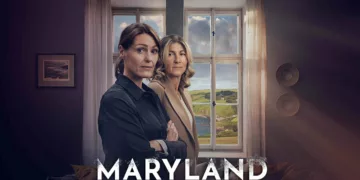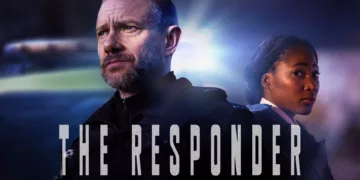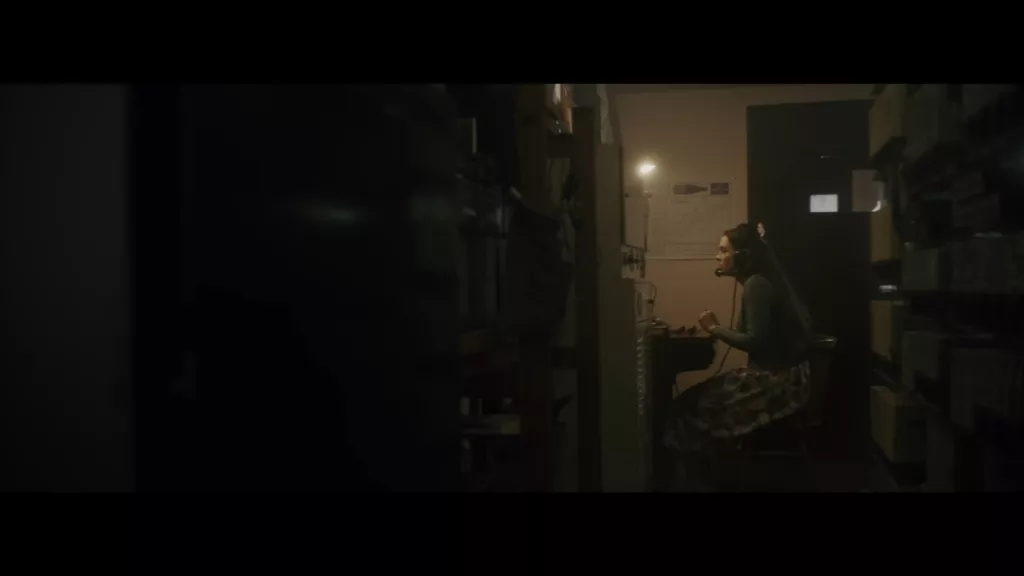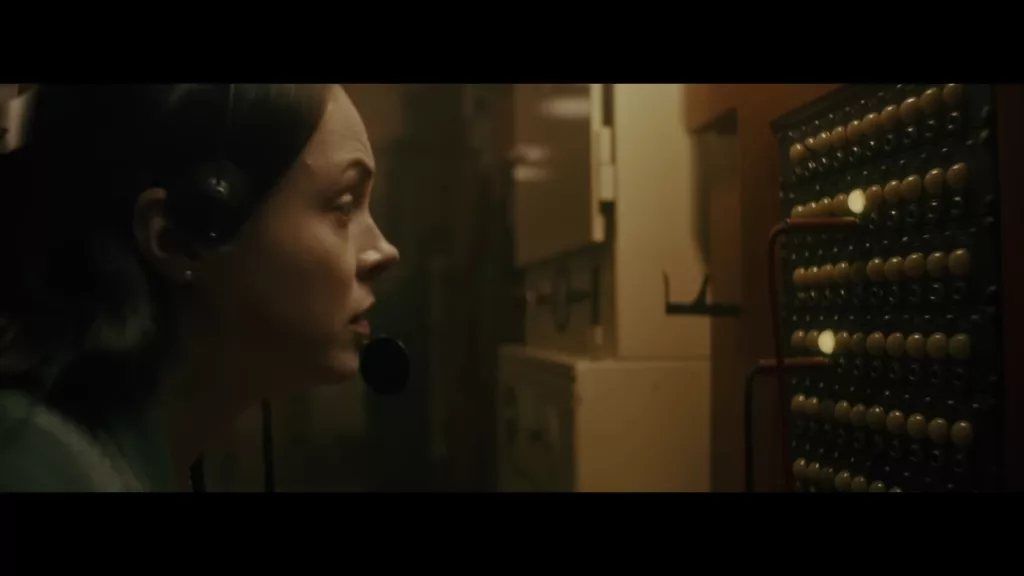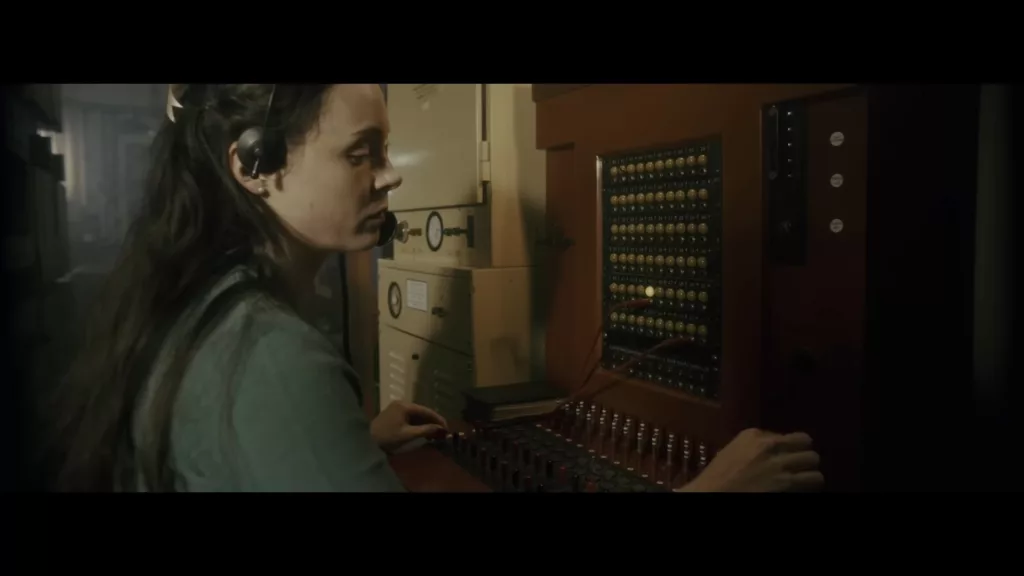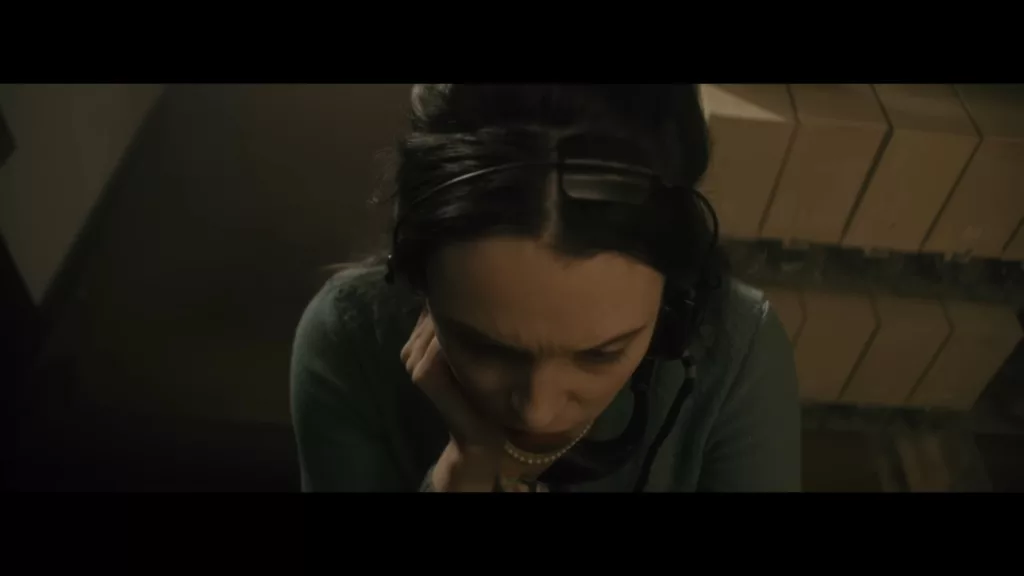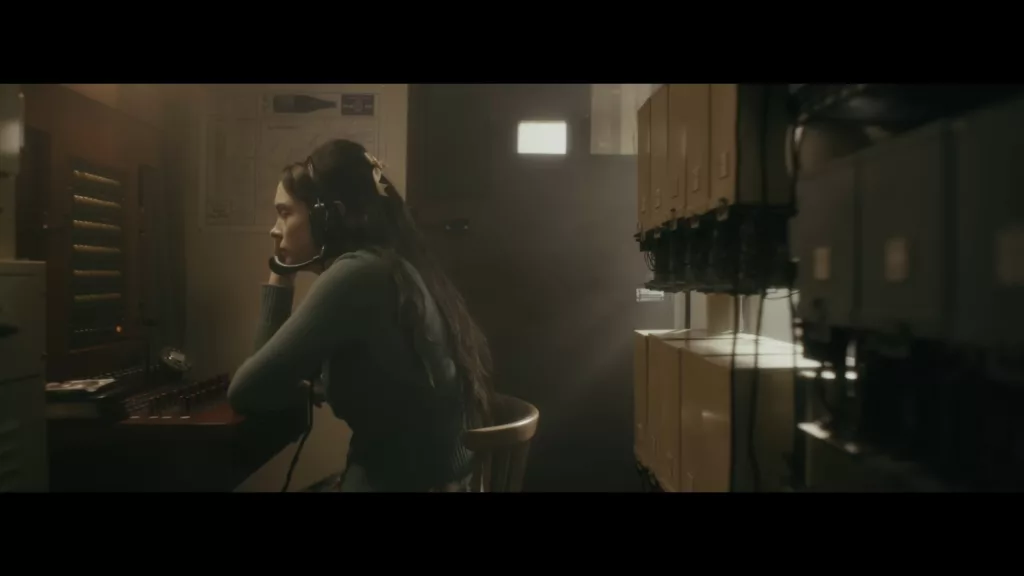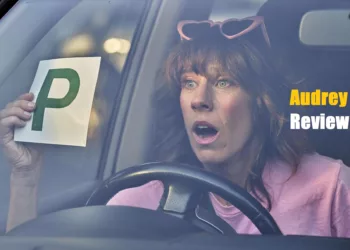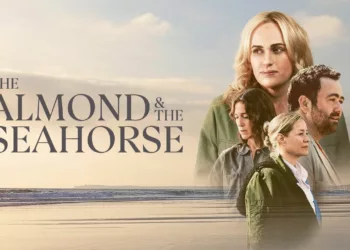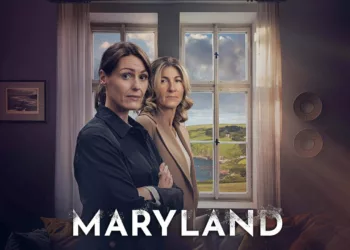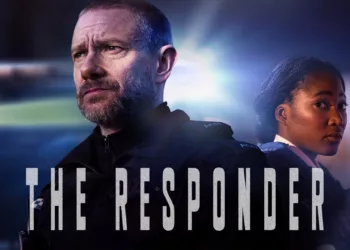Get ready for a one-of-a-kind viewing experience with On The Line, a scrappy little indie thriller that packs some seriously creative punch. This newcomer flick marked the feature debut of British filmmaker Oliver Pearn, who served triple duty as writer, director and producer. Set in the early 1960s on Alderney, a tiny island in the English Channel, it unfolds entirely within the confines of a telephone exchange office. Now I don’t know about you, but just the description alone made me do a double take – a period drama that takes place solely in a single room? And starring pretty much just one on-screen actress? I won’t lie, it sounded crazy intriguing from the get-go.
Leading the charge is the endlessly charming Victoria Lucie as Agnes, a plucky telephone operator whose job involves manually connecting island residents by plugging cables into an analog switchboard. It’s a far cry from the era of speed dial and smartphones, that’s for sure. Now Agnes may spend her days confined to the four walls of that little office, but her voice connects her to the outside world in surprising ways. Especially when an ominous call suddenly sets a harrowing chain of events into motion that only Agnes can intervene in…from her isolated perch behind the switchboard.
Yeah, On The Line basically takes the old “one location, one character” set-up pioneered in classics like Rope and Buried, then adds its own unique twist. Watching Lucie single-handedly carry this ambitious micro-indie concept is half the fun. But will first-timer Pearn successfully rise to the challenge of this deliberately constrained premise? Or will the story’s claustrophobic limitations only highlight his rookie shortcomings as director? Well, strap in and get ready to find out, my friend! Something tells me this underdog flick will dial up some unexpected surprises.
Meet Agnes, the Magnetic Heart of On The Line
I’m just gonna come right out and say it: Victoria Lucie straight up makes this movie. As telephone operator Agnes, she’s saddled with the mighty task of basically carrying the entire flicker on her shoulders. And let me tell ya, this rising star makes it look downright easy. Through lively voice work and subtle facial expressions, Lucie manages to take a character confined to a claustrophobic office and transform her into the magnetic, pulsating heart of On The Line.
As an operator for the Alderney telephone exchange in the early 60s, Agnes spends her days manually connecting island residents through analog switchboards and cables. It’s a tedious job, no doubt, but Lucie plays Agnes with such infectious warmth and spirit that you can’t help but root for her. We get delightful glimpses into Agnes’ inner world through telling details: the way she practices her elocution when calls are slow, or sneaks a crafty cigarette when she thinks no one’s listening.
And that distinctive voice of hers is truly the keystone that makes On The Line work. With clipped Received Pronunciation tones layered over her regional accent, Agnes speaks with the posh inflection so prized in 1960’s telephone operators. Yet Lucie ensures Agnes never feels robotic or affected. Even when adhering to her pleasant professional voice, Agnes’ lively personality and wit shine through. We intrinsically understand why this small-town girl was once crowned “Best Telephone Voice” for the region.
So when a cryptic call suddenly sets a violent crime in motion, Agnes’ defined voice becomes our lifeline. Lucie’s fantastically layered performance transforms from cheerful to increasingly frantic, matching the viewer’s escalating concern beat by beat. Her expressive face wordlessly conveys shock, concentration, doubt, worry, relief – all while confined to that tiny office. Thanks to Lucie’s masterclass in captivating screen acting, Agnes remains endlessly compelling despite her physical isolation.
By gifting Agnes such magnetism and humanity, Lucie provides the steady anchor that prevents On The Line from drifting out to sea. While flaws in Pearn’s directorial debut are apparent at times, his star shines bright enough to redeem much. So kudos to Victoria Lucie for crafting one of the most memorable lead heroines in recent indie memory. Agnes IS On The Line – and a character as indelible as hers deserves to be seen.
Scrappy Filmmaking Fosters Claustrophobic Tension
Now given that On The Line marked director Oliver Pearn’s indie debut, expectations for flashy set pieces and effects extravaganzas shouldn’t exactly be sky high here. But what this micro-budget newcomer lacks in finances, it makes up for in scrappy creativity behind the scenes. Constrained by limited resources, Pearn instead opts to foster tension through thoughtful shot framing, sound design, and period detail work.
With cinematographer Jonathan Nicol, Pearn often frames lead actress Victoria Lucie in unnerving extreme close-ups. As Agnes fields increasingly alarming phone calls from her solitary switchboard perch, the camera presses tighter against Lucie’s expressive face. The distress escalating across her eyes, brows, and pursed lips amps up the claustrophobic vibe exponentially. By isolating Agnes within such an intensely intimate visual bubble, Pearn’s lean style effectively constructs a pressure cooker of nail-biting unease.
The electronic pulses and clicks of that hefty old switchboard also factor heavily into the film’s nervy atmosphere. Composer Matthew Collings deftly incorporates metallic creaks and disconnect tones into the unsettling score. Sound design seems heightened too – common noises like plugs slamming into jacks or Agnes’ anxious heel taps against the floor feel jarringly magnified.
And despite the micro-budget, costume and production design still impressively capture early 60’s aesthetics. While Agnes spends every scene in that cramped basement office, era-appropriate touches like emerald green walls, vintage switchboard machinery, and Lucie’s smart powder blue uniform evaporate modernity. Visual details feel well-researched and convincingly transportive.
So sure, with more dough On The Line may have flexed some flashy stylistic muscle. But Pearn’s debut ultimately proves ingenuity and vision can create tense cinematic worlds for pennies. What this indie lacks in finances, it makes up for with an abundance of creative scrappiness.
Crisis Unfolds Over The Wires As Agnes Races To Respond
When a cryptic distress call abruptly crackles over the switchboard wires one stormy night, Agnes quickly finds herself embroiled in an escalating crisis occurring beyond her isolated office walls. After calmly assisting island residents all evening, our unflappable operator suddenly becomes an emergency dispatcher for a suspected kidnapping unfolding in real time. But deprived of visual details, Agnes can only piece together fragmented clues from frantic voices pleading through the receiver.
It’s a race against the clock as mild-mannered Agnes strains to coax context from cagey calls, pinpoint locations from obscure background noise, and convince skeptical local authorities over the soil-caked cables that a crime is occurring. This urgent central storyline definitely dials up the tension exponentially, placing humble telephone operator Agnes in an unexpected position of power behind her switchboard. She alone serves as both the island’s communication hub and sole lifeline for this victim in distress.
Yet despite Agnes’ confident competence handling island connections all day, we soon glean worrying hints that she may carry credibility issues from past mistakes. Brief references to police exam failures or dismissing superiors hint our fearless protagonist perhaps still carries wounds surrounding past trauma. So when the abductee’s scattered pleas initially meet indifference from authorities, underlying self-doubt clearly compounds Agnes’ frantic frustration. This layered characterization, fueled by Lucie’s subtly stirring performance, adds compelling depth to the tense proceedings.
That said, critical moments in the final act do stretch believability for viewers. Without modern mobile flexibility, Agnes fields calls from multiple shifting locations remarkably quickly despite 1960s infrastructure limitations. Public telephone booth availability across random coastal stretches or remote woodlands feels questionable too. These plot implausibilities aren’t deal-breakers, but definitely disrupt narrative immersion briefly.
However, while the climax falls slightly short, potent slow-burn suspense permeates much of On The Line. Watching Lucie’s Agnes grapple for answers she can’t see keeps engagement gripped tight. Clever sound editing even transforms mundane noises like switched plugs or finger taps into nerve-fraying jump scares. For majority of the brisk runtime, Pearn masterfully winds suspense around Agnes’ confined predicament. So while the filmmaker still has kinks to iron out, his thrilling premise finds confident footing more often than not.
How Does This Debut Stack Up Against One-Person Greats?
Now given its creative constraints, On The Line will inevitably draw comparisons to classics like Alfred Hitchcock’s Rope or claustrophobic game-changers like Locke and Buried. And while Pearn’s micro-budget indie can’t quite reach the nail-biting heights of those masterclasses, it does stand confidently alongside them in many regards.
While Pearn’s thriller avoids Hollywood exaggeration in favor of endearing realism, the danger feels lower-stakes than Hitchcock’s best. We believe Agnes faces a legit crisis, but the tension simmers more than boils over. Compared to the imminent, moment-to-moment urgency conveyed in Buried’s coffin or Locke’s careening car, On The Line’s pacing sometimes slides towards procedurally brisk.
Visually too, Pearn struggles to eclipse the crackling invention of his notable one-person predecessors. On The Line often resembles a radio drama unfolding on-screen rather than a uniquely cinematic experience. While Lucie remains endlessly compelling, Pearn’s shot selection rarely amplifies Agnes’ isolation beyond what audio alone could convey. Given its visual nature, cinema may not have been the strongest medium for this story.
Yet among its micro-budget peers, On The Line still mightily impresses at times. Despite limitations, Lucie delivers a performance so compelling she could absolute carry a prestige Netflix vehicle. And Pearn’s ability to wring such simmering tension from two cramped rooms and some telephone props deserves applause. While it never quite escapes its theatrical shackles, On The Line still stands tall for its white-knuckle concept alone.
So no, this audacious upstart can’t surpass iconic single-actor greats yet – but the raw ingredients for possible future brilliance percolate promisingly. Given more resources and creative freedom, Pearn could likely craft an instant indie darling. For now, it’s still damn impressive how much pulse-pounding entertainment he wrings from one little room, one determined actress, and a whole lotta telephone wires.
Trauma And Integrity Shape Agnes’ Hero’s Journey
While framed as a tense thriller, the crises plaguing Agnes – both behind the switchboard and within – tackle some thoughtful concepts that elevate On The Line beyond mere genre fare. Friends, this scrappy little indie explores surprisingly substantial themes for its modest trappings.
See, we slowly learn that the suicide of Agnes’ childhood best friend Hannah still haunts her, stoking an almost ruthless determination to prevent harm when she suspects another islander may meet harm. Through haunting dream sequences and references to her shattered psyche in the wake of Hannah’s death, it becomes clear Agnes fiercely struggles to regain control she feels she lost back then. Preventing another tragedy could be her long-awaited redemption.
Pearn also poignantly conveys how community trauma from WWII lingers over these characters like a shadow, despite the intervening decades. Hints about loved ones lost in combat or emotional distance between Agnes and her veteran father illustrate trauma’s far-reaching scars. Yet resilience and integrity shine through too in those still wrestling with old wounds.
We witness Agnes’ own quiet stand for autonomy and moral conviction as she faces immense pressure to conform to expectations around her pending marriage to overbearing fiancé Thomas. Subtle themes questioning traditional gender roles, mental health stigma, and finding one’s voice gently underscore the proceedings.
So while marketed as an artsy little thriller, On The Line harbors some weighty themes beneath its indie frames. The crises plaguing Agnes behind that switchboard reveal characters still seeking meaning and moral clarity in the fallout surrounding past pain.
Scrappy Debut Shows Promise Despite Flaws
Well friends, while On The Line doesn’t quite stick the landing, it’s still one mighty impressive swing for newcomer Oliver Pearn. Despite rookie stumbles, this micro-budget thriller absolutely deserves a spot on your radar for its sheer moxie alone.
At just 90 minutes, On The Line remains focused and never overstays its welcome. But that brevity does highlight the story’s somewhat thin substance. While the set-up seems better suited for a play or fiction podcast, Pearn still crafts plenty of simmering tension here. It likely won’t rewrite any genre rulebooks, but his clever concept and Lucie’s compelling performance make for a solid evening’s entertainment.
For a heavily confined story relayed through audio calls and tight facial shots, though, Pearn’s execution could have taken bolder visual risks. Still, immense creativity and artistry shine through in the detailed sound design, aesthetics, and layered lead performance. On The Line punches far above its weight given meager resources.
So while not groundbreaking, Oliver Pearn’s scrappily inventive debut still thrills and impresses in all the right places. Agnes is a heroine worth cheering for and On The Line a noteworthy first step for an upstart director with moxie to spare. Here’s hoping Pearn gets another shot behind the lens soon, this time with enough dough and creative freedom to really spread his wings. Because while flawed, his indie instincts absolutely shine bright in this first effort. More Pearn productions, please and thank you!
With its charismatic lead, clever concept, and admirable artistry, On The Line signals the start of a promising career if I ever saw one. It may fall slightly short, but the skillful storytelling and infectious heart on display here got me firmly rooting for cast and crew alike. What a thrill to witness careers catch fire and talented newcomers find their cinematic footing. So hats off to you, Oliver Pearn and Victoria Lucie. Hollywood better be taking notes, because with scrappy daring and raw talent like this, the future of film looks bright indeed!
The Review
On The Line
Despite some rookie flaws, "On The Line" is an impressively scrappy and creative indie thriller elevated by Victoria Lucie's magnetic lead performance. With clever concept and admirable artistry, Oliver Pearn's directorial debut shows immense promise.
PROS
- Victoria Lucie gives a captivating, expressive lead performance
- Clever and unique single location premise
- Tense, suspenseful narrative
- Impressive tension created through sound design and framing
- Strong period-appropriate production design
- Explores thoughtful themes related to trauma and integrity
CONS
- Some plot implausibilities in final act
- Pacing drags occasionally
- Visually resembles a radio drama at times
- Could have taken bolder risks given constraints




